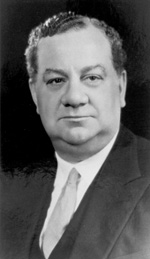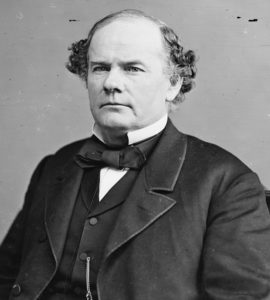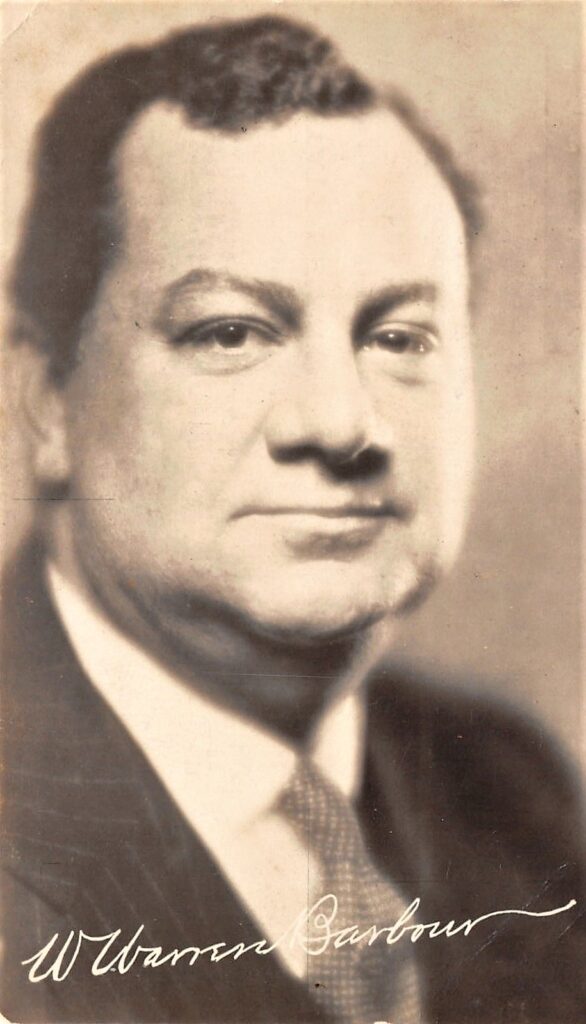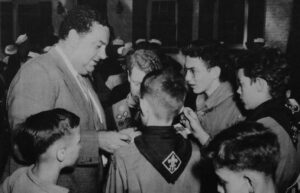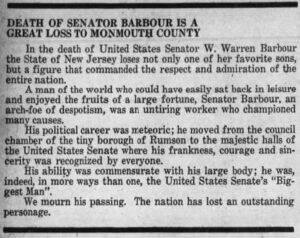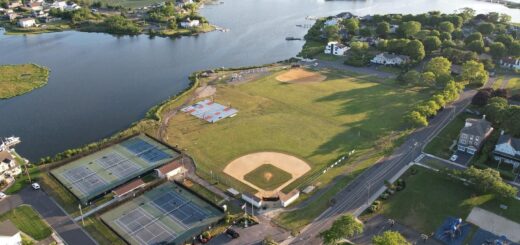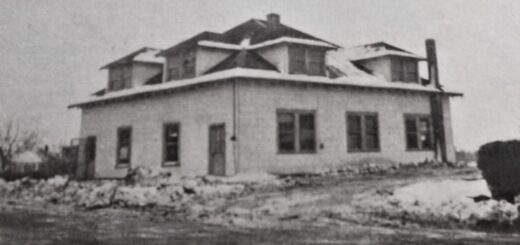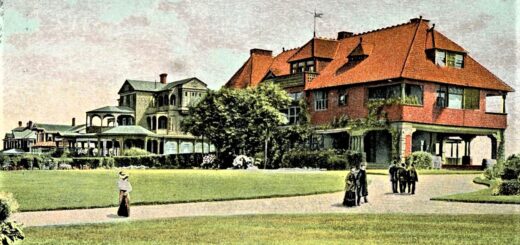Senators from Monmouth Beach
In my ongoing efforts at researching Monmouth Beach history, I have found at least two United States Senators who were residents and had strong influence on the Jersey Shore town. And several others had minor local connections.
First and foremost was William W. Barbour, a US Senator for New Jersey from 1931 to 1943 and a Monmouth Beach native. The other, Alexander G. Cattell, New Jersey’s US Senator from 1866 to 1871, helped organize the town into a private resort. Both guys were very rich and very Republican.
Barbour was born in his father’s Ocean Avenue mansion in July 1888. An amateur heavyweight boxing champion in 1910-11, Barbour turned down a chance to fight pro heavyweight champ Jack Johnson (his mother advised against it). Upon his father’s death in 1917, he dropped out of Princeton University to take over the family business. Later he served as Rumson’s mayor from 1923 to 1928. Before politics, he served in the NY National Guard for a decade, becoming a captain.
No doubt his father Colonel William Barbour — one of the late 19th century’s most connected players — whetted his interest in politics. In addition to being a founder and president of the Monmouth Beach Country Club in the late 1890s, Col. Barbour was active in national politics as Treasurer of the Republican National Committee.
Barbour proved his “worthiness,” according to the 1943 Red Bank Daily Register, in winning two out of three US Senate races as a New Jersey Republican “during the New Deal’s height of power.” Known for promoting social justice, he was an early and vocal advocate for offering Jewish Holocaust victims more American support and protection. He died while still a senator in Washington, DC in November 1943. The Long Branch Daily Record claimed many in the state “looked upon him as presidential timber,” prior to his sudden death in the middle of a world war.
* * * * *
In 1871, Cattell was one of the first major developers of Monmouth Beach. He owned a large house on the eastside of Ocean Avenue just north of Valentine Street. His claim to fame — three years prior he voted to convict President Andrew Johnson of impeachment charges.
Senator Cattell was one of 20 prominent citizens to form the Monmouth Beach Association. Incorporated in Spring 1871, the group is largely credited with drawing up the blueprints for the borough. The Salem, NJ native, born in February 1816, was a respected state banker and legislator prior to his election to the Senate. He was also a member of the first US Civil Service Commission and served on the NJ Board of Tax Assessors and NJ State Board of Education.
In May 1868, Cattell was one of 35 US senators to vote to convict President Andrew Johnson. The measure fell just one vote short of the two-thirds majority required to remove a sitting president. New Jersey’s other senator, Republican Frederick T. Frelinghuysen, also voted to convict the Democrat president. Notable is that his great-grandson, US Rep. Rodney Frelinghuysen, who represented NJ’s 11th district in the US Congress for 22 years, joined with a House majority and voted to impeach President Bill Clinton in December 1999. Congressman Frelinghuysen retired on 2019.
Senator Cattell and his associates (including George Robeson, then US Navy Secretary under President Ulysses S. Grant) had acquired the “Monmouth Beach property” from Dr. Arthur V. Conover. The Freehold physician had bought the tract for $5 an acre in 1865 from the heirs of Major Henry Wardell, the great-great grandson of the area’s first settler, Eliakim Wardell.
The association’s goal was to create an “exclusive resort on the Jersey Shore.” Guided by a managing partner, John Torrey, Jr., an engineer was retained and the borough’s first streets and property plots were laid out. It was the beginning of the glory days for the rich and famous in Monmouth Beach. Senator Cattell founded the community of Merchantville in Camden County, NJ prior to his April 1894 death.
* * * * *
A little more digging shows that the daughter of Senator H. Alexander Smith (a Republican who served NJ from 1944 to 1959) was married at the St. Peter’s Church of Galilee in town. She married a member of the Dominick family, which would produce its own senator, Peter H. Dominick, a Republican who represented Colorado from 1963 to 1975. Also, the uncle of Senator Nicholas F. Brady (a US senator for NJ during 1982) owned a large house on Ocean Avenue in Monmouth Beach.
In 1890, Senator John R. McPherson spent the summer in Monmouth Beach. A Democrat, he represented NJ from 1877 to 1895. Republican Senator Stephen B. Elkins of West Virginia summered in Monmouth Beach in 1894; he was also US Secretary of War (1891-93). And don’t forgot Garrett A. Hobart, a Monmouth Beach property owner. When he was Vice President of the US from 1897 to 1899, he was also President of the US Senate.
* * * * *
If you’ve done some reading on American government and politics, you know that the job of United States Senator is perhaps the best ever conceived. Formed by the US Constitution in 1787 and long known as “World’s Greatest Deliberative Body,” 100 senate members serve for 6 years (plenty of time for voters to forget), wield vast power over entire states (including New Jersey with nearly 9 million residents) and earn $174,000 per year plus generous health benefits and handsome federal pension (98% of American workers get less). Senators also get personnel and office expense accounts (for US senators from NJ the annual allowance reaches $3.5 million). Plus, they get to talk all the time (often without result).
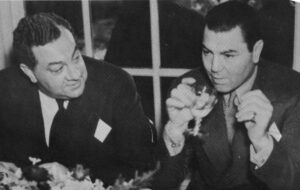
“The Millionaire Kid” — US Senator Barbour with Jack Dempsey in Asbury Park, 1936. The pro heavyweight champion (1919-1926), Dempsey died in 1983. The amateur heavyweight champion (1910-1911); Barbour died in 1943. In his final bout in 1911, Barbour tipped the scales at 250 pounds. The former world heavyweight champion boxer (1892-1897), James J. Corbett, called Barbour a “wonder in the ring.”
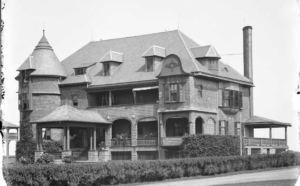
Senator’s Birthplace — The Barbour house on Ocean Avenue, 1905. The father Colonel William Barbour — a Gilded Age leading man — owned the large seashore cottage. Designed by Stanford White, it was torn down in 1973 to build the Admiralty high-rise. Born in 1855, he founded the Barbour Linen Thread Company, which manufactured linen treads for fishing lines and nets (including several mills and plants, it was a big business then). Barbour was known in Monmouth Beach for entertaining “some of the first people of the land” and for conducting “the finest musical concerts of the Jersey Coast.” When he died in March 1917, he left a $15 million estate. His pallbearers included then NYC Mayor John Purroy Mitchel and Charles Evans Hughes, a US Supreme Court Chief Justice and 1916 Republican nominee for President.
